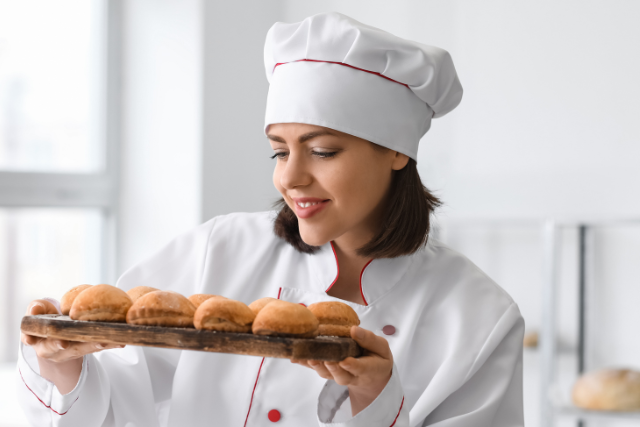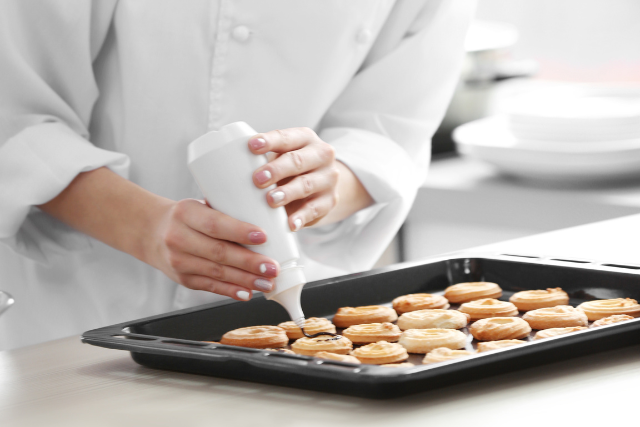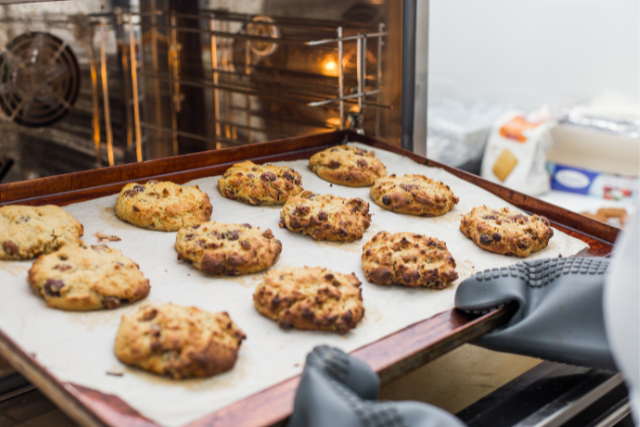
In a market crowded with bake shops, unique signature products make all the difference. Customers seek memorable flavors and textures that set one shop apart. Baking and pastry arts education provides the essential skills and knowledge to create these standout offerings. Baking and pastry schools like CCA Manila offer aspiring bakers practical experience and a strong foundation to develop creative, high-quality baked goods.
This article explores how baking and pastry arts help you develop signature products that elevate your bake shop.
Building Core Baking Skills Through Structured Courses
The foundation of exceptional baked goods begins with mastering core skills. A comprehensive baking and pastry course teaches precise measuring, baking math, and safe ingredient handling to ensure consistent, high-quality results. Understanding how to use tools properly and how ingredients behave under different conditions gives bakers control and confidence in the kitchen.
Fundamentals like timing, temperature, and mixing techniques are essential to producing reliable products. These basics prevent common mistakes and create a dependable process that delivers the desired texture and flavor every time. With this strong foundation, bakers can confidently explore more complex recipes and develop unique signature items.
Exploring Diverse Product Categories to Expand Creativity
Exposure to various baked goods broadens skill sets and inspires new ideas. Learning to bake cookies and bars teaches balance in sweetness and texture. Bread-making introduces fermentation and dough skills. Courses also cover quick breads, sourdough, tarts, pies, chocolate confections, and frozen desserts.
This variety encourages experimentation. Combining techniques or flavors across categories opens doors to signature recipes that surprise and delight customers. Versatility also allows bakeries to meet different tastes and occasions.
In-Depth Courses That Build Expertise and Creativity
Short baking courses in Manila provide an efficient way to build essential skills without long-term commitments. These programs focus on practical techniques and knowledge, allowing busy learners to gain hands-on experience and grow confidence quickly. With expert instructors and well-equipped kitchens, students sharpen their abilities while exploring creative baking.
Introduction to Pastry Arts + Baking Club

Introduction to Pastry Arts + Baking Club prepares aspiring bakers and pastry chefs to develop confidence and competence in the kitchen. The program begins by grounding students in the fundamentals, including a thorough introduction to essential baking tools and the basics of baking math, as well as skills necessary for precise measurement and recipe scaling.
From there, the course explores a broad spectrum of baked goods, ensuring learners gain hands-on experience across diverse techniques and product types. Covered items include:
- Cookies and Bars: Mastering cookies and bars means understanding how different mixing methods affect texture, such as creaming butter for a tender crumb or melting it for chewiness. Baking times and temperatures must be carefully controlled to achieve the right balance between crispness and softness. Experimenting with ingredients like nuts, chocolate chips, or dried fruit adds variety and personality to these treats.
- Rolls and Loaves: Making rolls and loaves requires skillful dough handling, including kneading to develop gluten and managing fermentation to build flavor and structure. Proper shaping influences the final texture, whether aiming for soft, fluffy rolls or crusty artisan bread. Environmental factors like humidity and proofing conditions also affect the outcome, requiring careful attention.
- Quick Breads: Quick breads use chemical leavening agents such as baking powder or baking soda instead of yeast. Learning how these agents react in batters helps produce moist and tender breads with a fine crumb. Popular examples include banana bread, muffins, and soda bread.
- Sourdough: Sourdough relies on natural fermentation with wild yeast and bacteria in a starter culture. Maintaining the starter’s health is essential for flavor and rise. Bakers control fermentation time and temperature to develop sour notes and open crumb texture. Though time-intensive, sourdough yields bread with rich complexity and a chewy bite.
- Tarts and Pies: Preparing tarts and pies involves making doughs that result in flaky, tender crusts that hold fillings well. Different dough types, such as pâte brisée or pâte sucrée, require careful mixing and chilling to avoid toughness. Balancing sweet or savory fillings demands attention to texture and flavor combinations. Baking must ensure crisp crusts and properly set fillings.
- Crepes and Chouquettes: Making crepes requires preparing a thin, smooth batter and cooking it evenly to achieve a delicate, lightly browned surface. Chouquettes are small, airy pastries made from pâte à choux dough, which involves cooking and whipping to create a light texture. Both require precise technique and timing for the best results.
- Frozen Desserts: Frozen desserts include ice creams, sorbets, and custards. Balancing sugar, fat, and dairy ingredients creates creamy textures and rich flavors. Understanding freezing methods and air incorporation ensures smoothness and scoopability. Developing unique flavors adds appeal and variety.
- Cakes: Baking cakes involves mastering different batter types that yield various textures, such as butter, sponge, or chiffon. Techniques for layering, filling, and frosting techniques affect the final presentation and taste. Basic decoration skills like crumb coating and piping enhance appearance without overwhelming the flavor.
This range encourages not only technical skill-building but also creative exploration. Students learn to recognize how different ingredients and techniques interact, enabling them to innovate while respecting baking traditions.
Fundamentals in Baking & Pastry Arts
Fundamentals in Baking & Pastry Arts is designed for those seeking a more comprehensive and immersive understanding of baking principles and practices. The course focuses on critical foundational knowledge, with special attention to:
- Food Safety: Detailed protocols and standards that ensure hygienic handling, storage, and preparation of ingredients and finished products.
- Baking Math: In-depth study of measurements, percentages (baker’s math), conversions, and recipe adjustments for consistent results.
- Green Chefmanship: Emphasis on sustainability in the kitchen, including waste reduction, energy-efficient techniques, and sourcing eco-friendly ingredients.
- Core Techniques and Methods: Extensive hands-on practice with mixing, kneading, proofing, baking, and finishing a variety of pastry and baked items.
Students apply these principles directly to diverse baked goods and patisserie products, learning to replicate recipes and understand the ‘why’ behind each step. Early modules introduce professional baking basics, advancing to deeper familiarity with kitchen tools, ingredient functions, and workflow management.
the ‘why’ behind each step. Early modules introduce professional baking basics, advancing to deeper familiarity with kitchen tools, ingredient functions, and workflow management.
Master Baking Skills with CCA Manila!
Unique products in a competitive bake shop market separate one-time buyers from loyal customers. Baking and pastry arts education equips you with the skills to create those defining items that shape your brand.
At CCA Manila, training focuses on mastering essential techniques while encouraging creative exploration. You’ll learn how ingredients interact, balance flavors and textures, and present baked goods that look as enticing as they taste.
Ready to develop signature products that make your bake shop stand out? Apply now at CCA Manila and gain the baking and pastry skills that turn your ideas into lasting favorites.
